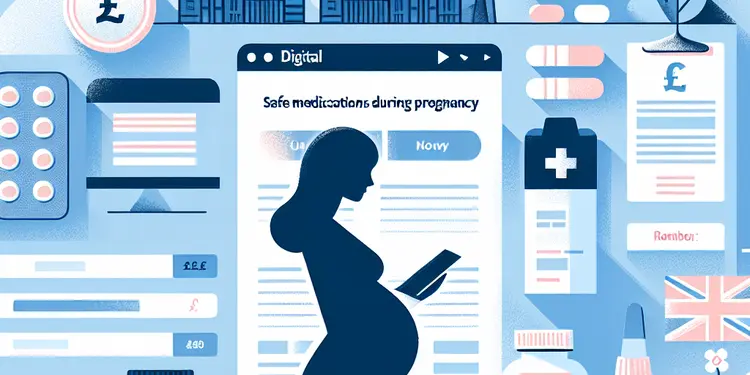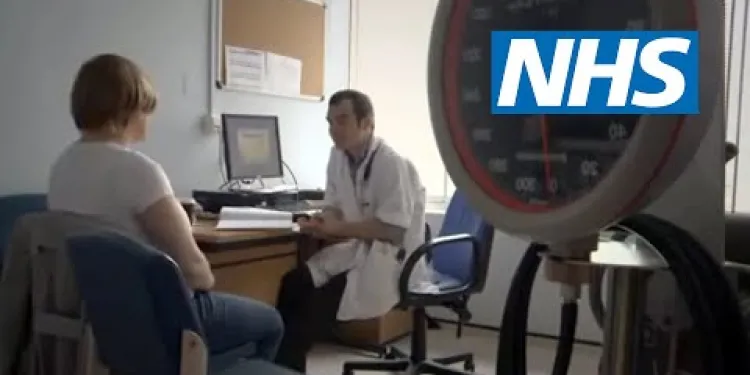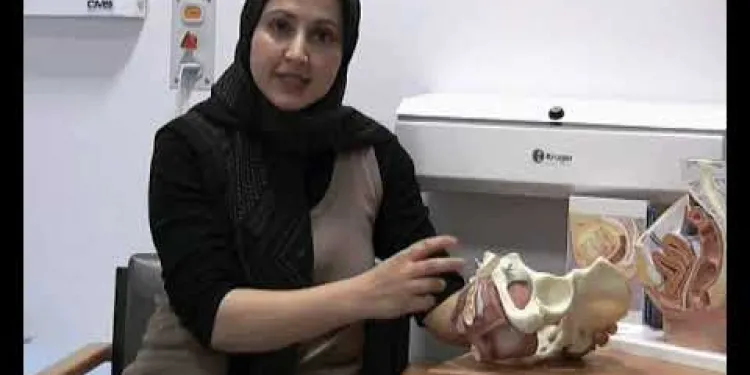
Find Help
More Items From Ergsy search
-

How can the risks and benefits of medications during pregnancy be assessed?
Relevance: 100%
-

How does exercise benefit pregnancy?
Relevance: 54%
-

Can medications affect pregnancy test results?
Relevance: 50%
-

Are there any AI-based tools available for lung cancer risk assessment?
Relevance: 45%
-

Is there any risk of using paracetamol outside of pregnancy with regard to autism?
Relevance: 45%
-

Where can individuals find reliable information on the safety of medications during pregnancy?
Relevance: 45%
-

Do I need to consult a doctor before exercising during pregnancy?
Relevance: 41%
-

HIV and pregnancy | NHS
Relevance: 41%
-

Is cycling safe during pregnancy?
Relevance: 40%
-

Gestational Diabetes during pregnancy
Relevance: 40%
-

Can antihypertensive medications reduce stroke risk?
Relevance: 39%
-

How soon can a pregnancy test detect pregnancy?
Relevance: 39%
-

What should I do if I start bleeding during early pregnancy? | NHS
Relevance: 39%
-

Can a pregnancy test detect a miscarriage?
Relevance: 39%
-

Can postnatal depression affect subsequent pregnancies?
Relevance: 38%
-

What is a pregnancy test?
Relevance: 38%
-

What if my pregnancy test is positive?
Relevance: 38%
-

Can I continue running during pregnancy?
Relevance: 38%
-

What is the risk of miscarriage? | NHS
Relevance: 37%
-

Are there risks associated with IVF?
Relevance: 37%
-

What are some general recommendations for medication use during pregnancy?
Relevance: 37%
-

What are the different types of pregnancy tests?
Relevance: 36%
-

Does IVF guarantee pregnancy?
Relevance: 36%
-

What exercises can I do during pregnancy?
Relevance: 36%
-

Can diabetes medications also help reduce heart attack risk?
Relevance: 36%
-

Are there any risks associated with traveling to the EU for medical treatment?
Relevance: 36%
-

Can a pregnancy test expire?
Relevance: 36%
-

Are there any exercises to avoid during pregnancy?
Relevance: 36%
-

How does a pregnancy test work?
Relevance: 35%
-

Can I do abdominal exercises during pregnancy?
Relevance: 35%
-

How is PIP assessed?
Relevance: 35%
-

Physiotherapy Assessment of Urinary Incontinence
Relevance: 35%
-

When should I take a pregnancy test?
Relevance: 35%
-

Is swimming a good exercise during pregnancy?
Relevance: 35%
-

Can Zika virus affect pregnancy?
Relevance: 35%
-

What can cause a false positive pregnancy test?
Relevance: 34%
-

What if my pregnancy test is negative and I still think I'm pregnant?
Relevance: 34%
-

How can I ensure safety during pregnancy exercises?
Relevance: 33%
-

Can I take exercise classes during pregnancy?
Relevance: 33%
-

What are the risks associated with a C-section?
Relevance: 33%
Assessing Risks and Benefits of Medications During Pregnancy
Determining the risks and benefits of medications during pregnancy is crucial for ensuring the safety of both the expectant mother and the developing fetus. Pregnant women often require medication due to pre-existing conditions or pregnancy-related issues, making it essential to balance potential risks and therapeutic benefits effectively. In the UK, healthcare professionals follow evidence-based guidelines to assess these factors carefully.
Engaging Healthcare Professionals
Consultation with healthcare professionals is a vital step in assessing medication risks and benefits during pregnancy. General practitioners, obstetricians, and pharmacists are key players in this process. They evaluate the woman's medical history, the potential health impacts of untreated conditions, and the safety profile of the medications under consideration. These professionals rely on the latest research and data from reputable sources, such as the British National Formulary (BNF), to guide their decisions.
Understanding Medication Categories
In the UK, the Medicines and Healthcare products Regulatory Agency (MHRA) regulates medications and categorizes them based on their risk levels in pregnancy. These categories help guide clinicians in their decision-making process. For instance, some medications may be labeled as safe, whereas others are contraindicated unless absolutely necessary. The safety categories are determined through clinical trials, observational studies, and post-market surveillance data, ensuring they reflect up-to-date scientific knowledge.
Analyzing Scientific Evidence
The analysis of scientific evidence is another important aspect of risk assessment. Systematic reviews and meta-analyses of clinical studies provide valuable insights into the effects of medications on pregnancy outcomes. This evidence helps healthcare providers weigh the benefits of drug intervention against potential risks, such as congenital anomalies, preterm birth, or developmental issues. Professional bodies like the National Institute for Health and Care Excellence (NICE) offer guidelines based on comprehensive reviews of the available data.
Considering Alternative Treatments
When assessing medications during pregnancy, exploring alternative treatments is often part of the evaluation process. Non-pharmacological interventions, such as lifestyle changes and stress management strategies, may reduce the need for medication or complement pharmacological therapies. Healthcare providers assess whether these alternatives can provide sufficient therapeutic benefits while minimizing potential risks to the fetus.
Monitoring and Follow-up
Once a medication is deemed necessary during pregnancy, ongoing monitoring and follow-up are critical. Regular check-ups allow healthcare providers to assess the effectiveness of the treatment and monitor for any adverse effects. This monitoring enables timely adjustments to the therapeutic plan, ensuring optimal outcomes for both mother and child. It also provides an opportunity to discuss any concerns or new symptoms with healthcare professionals.
Collaborative Decision-Making
Ultimately, assessing the risks and benefits of medications during pregnancy requires a collaborative approach. Open communication between the patient and healthcare team fosters informed decision-making. Pregnant women are encouraged to discuss their concerns and preferences, allowing for personalized care that respects their values while prioritizing the health and safety of both the mother and the fetus.
Checking Risks and Benefits of Medicines During Pregnancy
It's important to look at the good and bad sides of taking medicines when you are pregnant. This helps keep both the mum and baby safe. Pregnant women may need medicines for health problems they already have or new ones caused by pregnancy. In the UK, doctors use special rules to decide what medicines are safe.
Talking to Doctors and Pharmacists
It's very important to talk to healthcare professionals like doctors and pharmacists when deciding about medicines during pregnancy. They look at the mum’s health history and how not treating a condition might affect her health. They use the latest research from trusted sources to make these decisions.
Learning About Medicine Safety
In the UK, a group called MHRA checks how safe medicines are for pregnant women. They put medicines into different safety categories. Some are safe, and others are not unless absolutely needed. These categories are based on research and help doctors make the best choices for pregnant women.
Looking at Scientific Research
Looking at scientific research helps decide if a medicine is safe during pregnancy. Reviews of many studies show how medicines might affect the baby. This helps healthcare providers see if the medicine does more good than harm. Groups like NICE give advice based on this research.
Thinking About Other Treatments
Sometimes, doctors look at other ways to help rather than just giving medicines. Things like changing lifestyle or managing stress might help reduce the need for medicine. Doctors check if these ways are helpful and safe for the baby and mum.
Keeping an Eye on Health
If a pregnant woman needs medicine, doctors will keep checking to make sure it's working and not causing problems. Regular visits to the doctor help keep both mum and baby healthy. This time can be used to talk about any worries or new symptoms.
Working Together with Doctors
Making decisions about medicines during pregnancy works best when the mum and doctors talk openly. This helps everyone make good, informed choices. Pregnant women should feel comfortable sharing their thoughts and feelings to get care that respects what's best for both them and their baby.
Frequently Asked Questions
What is the first step in assessing medication risks during pregnancy?
The first step is consulting with a healthcare provider to review the medication's necessity and any potential risks to the mother and fetus.
How can the safety of a medication be determined during pregnancy?
The safety of a medication is assessed by reviewing available research, clinical guidelines, and FDA categories that classify the potential risks of medications during pregnancy.
What are FDA pregnancy categories?
The FDA pregnancy categories are a classification system used to indicate the potential of a medication to cause harm to the fetus when taken during pregnancy.
Why is it important to assess medication benefits during pregnancy?
Assessing benefits is important to ensure that the medication provides necessary therapeutic effects that outweigh potential risks to both mother and fetus.
Can all medications be assessed for risks and benefits during pregnancy?
Not all medications have sufficient data from clinical studies in pregnant women, so risk assessments are also based on animal studies and published literature.
What role do healthcare providers play in medication assessment during pregnancy?
Healthcare providers evaluate individual circumstances, discuss potential risks and benefits, and guide treatment decisions for their pregnant patients.
What information sources can be used to assess medication risks during pregnancy?
Sources include medication labels, published clinical studies, FDA drug classifications, and consultation with healthcare providers.
What is teratogenicity?
Teratogenicity is the potential of a substance to cause developmental abnormalities in the fetus when exposure occurs during pregnancy.
Are there guidelines for assessing drug safety during pregnancy?
Yes, several medical bodies provide guidelines, including the American College of Obstetricians and Gynecologists (ACOG) and the FDA.
How do other medical conditions impact medication decisions during pregnancy?
Pre-existing conditions may require continued medication management, influencing risk-benefit analyses to prioritize maternal health while minimizing fetal risks.
What is the importance of timing when assessing medication risks during pregnancy?
Different stages of pregnancy may have varying levels of risk for medication exposure, particularly during critical periods of fetal development.
What should pregnant women do if they need to take medication?
They should discuss with their healthcare provider to evaluate the safety, dosage, and necessity of the medication during their pregnancy.
How can lifestyle changes impact medication use during pregnancy?
Lifestyle changes, such as diet and exercise, might reduce the need for certain medications or mitigate risks associated with medication use.
Are over-the-counter medications also assessed for risks during pregnancy?
Yes, all medications, including over-the-counter, require risk assessment during pregnancy, as some may still pose potential risks.
How do medication risks differ between trimesters?
Risks can vary, with the first trimester often being more sensitive to teratogens, while the second and third trimesters may pose different types of development risks.
Can medications be substituted during pregnancy?
If a medication poses high risk, healthcare providers may suggest safer alternatives or adjust dosages as needed after careful evaluation.
What is the role of shared decision-making in medication use during pregnancy?
Shared decision-making involves collaboration between the pregnant woman and her healthcare provider to make informed, personalized decisions about medication use.
How do clinical trials influence medication assessments during pregnancy?
Few medications are tested directly in pregnant women due to ethical concerns, so assessments rely on observational data and retrospective studies.
Why is it important to maintain a medication record during pregnancy?
Keeping a detailed record helps healthcare providers track medications, manage potential interactions, and adjust treatments as necessary.
Are natural or herbal supplements safer during pregnancy?
Not necessarily, as some natural or herbal supplements may also pose risks and should be evaluated with the help of a healthcare provider.
What is the first step in checking if medicine is safe for a pregnant woman?
The first thing to do is to talk to a doctor. Ask them if you really need the medicine and if it could be bad for you or the baby.
How do we know if medicine is safe to use when pregnant?
We check if medicine is safe by looking at studies, doctor advice, and FDA rules. They help us know the risks of taking medicine when someone is having a baby.
What are FDA pregnancy categories?
The FDA helps keep people safe when taking medicine. They have special rules for pregnant women. These rules are called pregnancy categories.
Pregnancy categories tell us if a medicine is safe for a baby before it is born.
Doctors use these categories to know which medicines are okay and which ones might hurt the baby.
If you are pregnant, ask your doctor before taking any medicine.
You can also ask a pharmacist to help you understand if a medicine is safe.
The FDA pregnancy categories help doctors know if a medicine might hurt a baby if a mom takes it when she is pregnant.
Why should we check if medicine is good during pregnancy?
It is important to see if medicine is safe for a pregnant person and the baby. Medicines can help, but sometimes they might not be safe.
Use pictures or videos to help understand better. Ask a doctor or nurse if you have questions.
Checking the benefits is important. We want to make sure the medicine helps more than it may hurt the mother and baby.
Can we check if medicines are safe to take when you are having a baby?
We don't always have enough information about how medicines work in pregnant women. Scientists also look at animal studies and other reports to understand the risks.
What do doctors and nurses do with medicines when someone is pregnant?
Doctors and nurses check each person to understand what's going on. They talk about what could be good or bad, and help decide the best way to take care of someone who is pregnant.
Where can you find out if medicine is safe to take when pregnant?
If you need help, you can ask a doctor or a nurse. They know a lot about medicine.
You can also read books or use websites made for parents. Some have good advice.
There are special phone lines where you can talk to someone about medicine and pregnancy.
We find information from medicine labels, medical studies, FDA drug lists, and talking to doctors.
What is teratogenicity?
Teratogenicity means some things can harm a baby growing inside a mother. These things can be medicines, chemicals, or other things. They can make the baby grow differently or cause problems.
If you want to know more or need help, you can talk to a doctor, read simple books, or use picture cards. These can help you understand better.
Teratogenicity means something can cause problems or changes in a baby growing inside a mom when she is pregnant.
If a mom is exposed to this thing, it can make the baby not grow normally.
To help understand, use pictures or videos about baby development. You can also ask someone to explain with simpler words.
Are there rules to check if medicine is safe for pregnant people?
Yes, there are groups that give advice about health. Some of these groups are called the American College of Obstetricians and Gynecologists (ACOG) and the FDA.
How do other health problems affect medicine choices when having a baby?
If you have other health problems, it can change the medicines you take when having a baby. Doctors might have to pick different medicines to keep you and your baby safe.
Things that can help:
- Ask your doctor questions.
- Write down what the doctor says.
- Bring someone with you to appointments to help remember things.
If you have a health condition already, you might need to keep taking your medicine. Doctors think about the good and bad things about this. They want to keep moms healthy and also keep babies safe.
Why is it important to think about timing when looking at medicine risks during pregnancy?
When a woman is going to have a baby, she must be careful with medicines. Timing matters because some medicines can be more harmful at certain times.
Here are some tips to help:
- Ask a doctor or nurse about safe medicines.
- Use an app to check medicine safety.
- Read labels carefully.
Being pregnant has different stages. At each stage, taking medicine can be more or less risky. Some stages are more important for the baby's growth, and that's when it's most risky to take medicines.
What if a pregnant woman needs to take medicine?
What can a pregnant woman do if she thinks she needs to take medicine?
Here are some steps that can help:
- Talk to a doctor: Ask your doctor if the medicine is safe for the baby.
- Read the label: Check the medicine bottle or package for safety information for pregnant women.
- Look for alternatives: Sometimes, there might be other ways or natural options that are safer.
If you have more questions:
- Use a talking app that can read the information out loud.
- Ask a family member or friend to help read and understand the information.
They should talk to their doctor to check if the medicine is safe, how much to take, and if they really need it while they are pregnant.
How do changes in daily habits affect medicine use during pregnancy?
Changing how you live, like eating healthy food and exercising, can help you need less medicine. It can also make taking medicine safer.
Do doctors check if store-bought medicines are safe for pregnant women?
Yes, all medicines, even the ones you can buy without a prescription, need to be checked for safety if you are pregnant. Some medicines might still be risky.
Do medicine risks change at different times during pregnancy?
Pregnancy is split into three parts called trimesters. This means early, middle, and late pregnancy.
Medicines can have different risks depending on which trimester you are in.
Ask your doctor or nurse about taking medicine when you are pregnant.
Try using pictures or charts to help understand the information better.
There are things called risks when you are having a baby. The first 3 months are very important. Bad things can hurt the baby more during this time. The next 6 months can have other kinds of risks that can affect how the baby grows.
Can you swap medicines when you are pregnant?
If a medicine might not be safe, doctors can offer different, safer medicine. They may also change how much medicine you take to make it safe for you.
How can doctors and mothers work together to decide on medicines during pregnancy?
When a woman is pregnant, she may need to take medicines. It is important for doctors and mothers to talk and decide together what is best.
Here are some ways to make this easier:
- Talk Clearly: Use simple words. Make sure both the doctor and the mother understand each other.
- Ask Questions: Mothers should ask questions if they don’t understand something.
- Use Pictures: Sometimes, pictures can help explain how medicines work.
- Take Notes: Writing things down can help remember important details.
- Bring a Friend: Having someone else there for support can be helpful.
Working together helps keep moms and babies safe and healthy.
Shared decision-making is when a pregnant woman and her doctor work together. They talk and decide the best choices about medicines for her.
How do clinical trials help check if medicines are safe to use during pregnancy?
Doctors are careful when testing medicine on pregnant women. Instead, they study how the medicine affects people by looking at past cases and patient stories.
Why should you keep a list of medicines when you are pregnant?
Keeping track of the medicines you take during pregnancy is important. Here’s why:
- Helps doctors know what you are taking.
- Makes sure the medicines are safe for the baby.
- Helps you remember to take the right medicine at the right time.
If writing is hard, you can try:
- Using a phone app to list your medicines.
- Asking someone to help you make a list.
Writing down all the details helps doctors and nurses know what medicine you take. They can then make sure different medicines are safe together and change them if needed.
Are natural supplements safe when you are pregnant?
No, not always. Some natural or plant medicine can also be harmful. It is important to ask a doctor or nurse for advice.
Useful Links
Have you found an error, or do you have a link or some information you would like to share? Please let us know using the form below.
-->
This website offers general information and is not a substitute for professional advice.
Always seek guidance from qualified professionals.
If you have any medical concerns or need urgent help, contact a healthcare professional or emergency services immediately.
Some of this content was generated with AI assistance. We’ve done our best to keep it accurate, helpful, and human-friendly.
- Ergsy carfully checks the information in the videos we provide here.
- Videos shown by Youtube after a video has completed, have NOT been reviewed by ERGSY.
- To view, click the arrow in centre of video.
- Most of the videos you find here will have subtitles and/or closed captions available.
- You may need to turn these on, and choose your preferred language.
- Go to the video you'd like to watch.
- If closed captions (CC) are available, settings will be visible on the bottom right of the video player.
- To turn on Captions, click settings .
- To turn off Captions, click settings again.
More Items From Ergsy search
-

How can the risks and benefits of medications during pregnancy be assessed?
Relevance: 100%
-

How does exercise benefit pregnancy?
Relevance: 54%
-

Can medications affect pregnancy test results?
Relevance: 50%
-

Are there any AI-based tools available for lung cancer risk assessment?
Relevance: 45%
-

Is there any risk of using paracetamol outside of pregnancy with regard to autism?
Relevance: 45%
-

Where can individuals find reliable information on the safety of medications during pregnancy?
Relevance: 45%
-

Do I need to consult a doctor before exercising during pregnancy?
Relevance: 41%
-

HIV and pregnancy | NHS
Relevance: 41%
-

Is cycling safe during pregnancy?
Relevance: 40%
-

Gestational Diabetes during pregnancy
Relevance: 40%
-

Can antihypertensive medications reduce stroke risk?
Relevance: 39%
-

How soon can a pregnancy test detect pregnancy?
Relevance: 39%
-

What should I do if I start bleeding during early pregnancy? | NHS
Relevance: 39%
-

Can a pregnancy test detect a miscarriage?
Relevance: 39%
-

Can postnatal depression affect subsequent pregnancies?
Relevance: 38%
-

What is a pregnancy test?
Relevance: 38%
-

What if my pregnancy test is positive?
Relevance: 38%
-

Can I continue running during pregnancy?
Relevance: 38%
-

What is the risk of miscarriage? | NHS
Relevance: 37%
-

Are there risks associated with IVF?
Relevance: 37%
-

What are some general recommendations for medication use during pregnancy?
Relevance: 37%
-

What are the different types of pregnancy tests?
Relevance: 36%
-

Does IVF guarantee pregnancy?
Relevance: 36%
-

What exercises can I do during pregnancy?
Relevance: 36%
-

Can diabetes medications also help reduce heart attack risk?
Relevance: 36%
-

Are there any risks associated with traveling to the EU for medical treatment?
Relevance: 36%
-

Can a pregnancy test expire?
Relevance: 36%
-

Are there any exercises to avoid during pregnancy?
Relevance: 36%
-

How does a pregnancy test work?
Relevance: 35%
-

Can I do abdominal exercises during pregnancy?
Relevance: 35%
-

How is PIP assessed?
Relevance: 35%
-

Physiotherapy Assessment of Urinary Incontinence
Relevance: 35%
-

When should I take a pregnancy test?
Relevance: 35%
-

Is swimming a good exercise during pregnancy?
Relevance: 35%
-

Can Zika virus affect pregnancy?
Relevance: 35%
-

What can cause a false positive pregnancy test?
Relevance: 34%
-

What if my pregnancy test is negative and I still think I'm pregnant?
Relevance: 34%
-

How can I ensure safety during pregnancy exercises?
Relevance: 33%
-

Can I take exercise classes during pregnancy?
Relevance: 33%
-

What are the risks associated with a C-section?
Relevance: 33%


